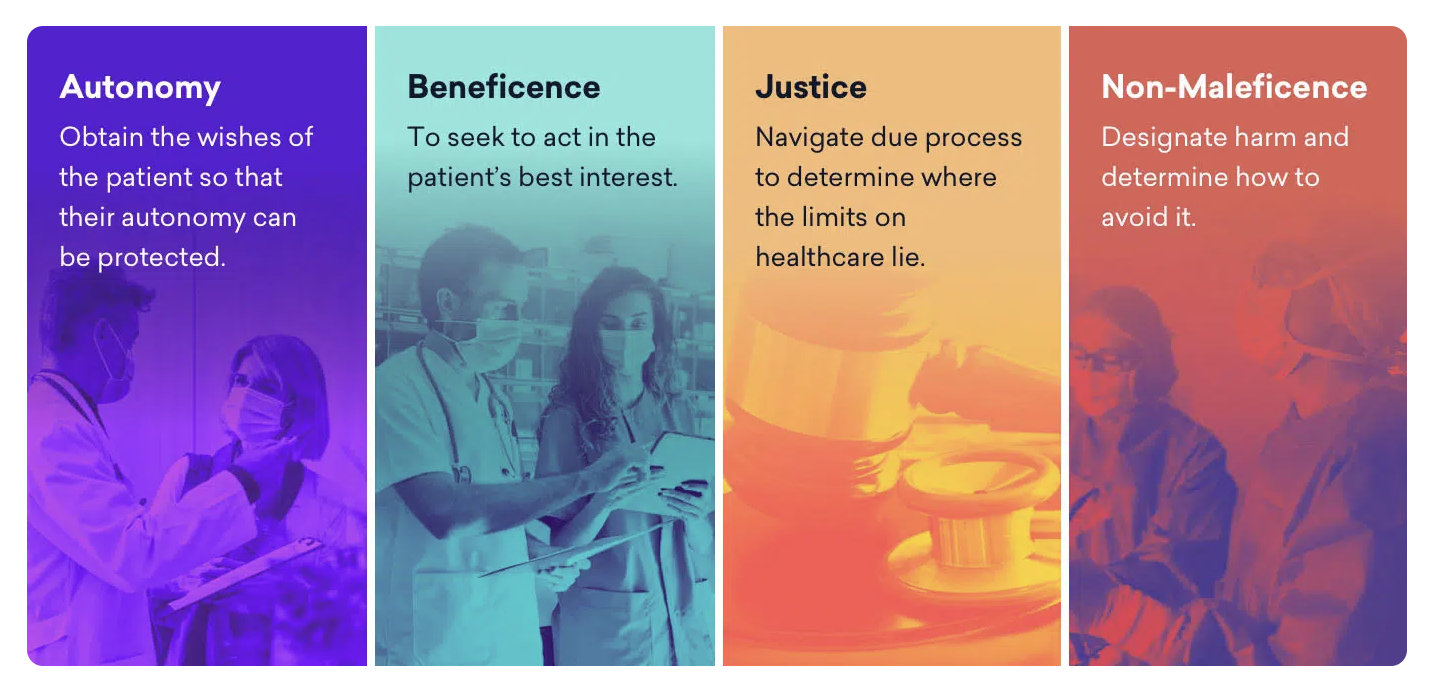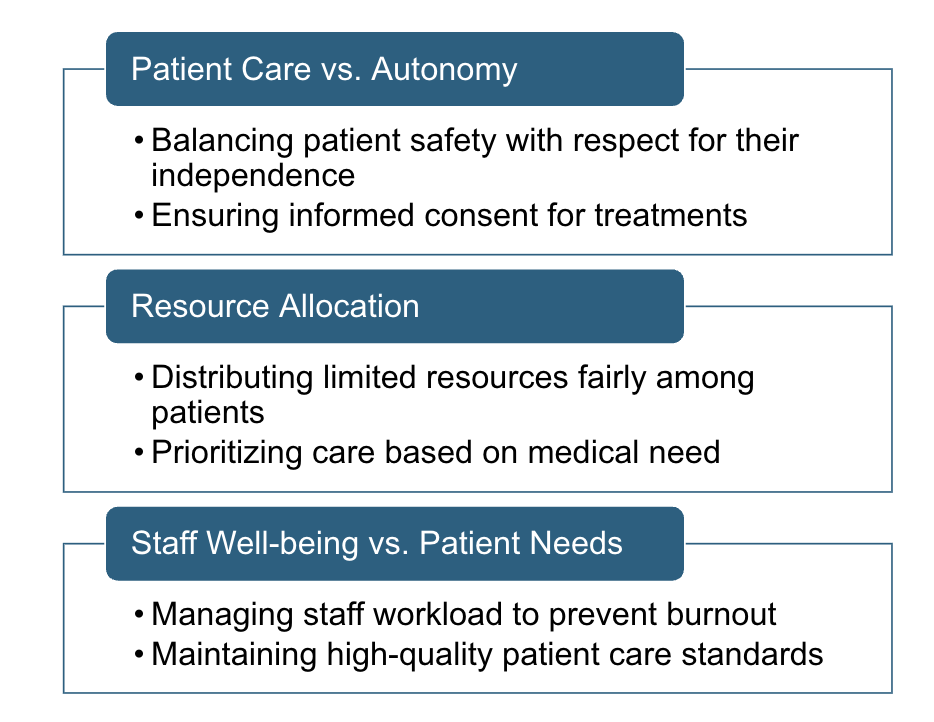Ethics in Healthcare: Navigating Complex Decisions in Modern Medicine
In today's rapidly evolving healthcare landscape, ethical considerations play a crucial role in shaping patient care, organizational policies, and medical decision-making. This blog explores the fundamental aspects of healthcare ethics and provides insights into managing common ethical dilemmas.
Key Takeaways:
Healthcare ethics revolves around four key principles:
Patient autonomy (right to make informed decisions)
Beneficence (doing good)
Non-maleficence (avoiding harm)
Justice (fair resource distribution).
Healthcare professionals must balance these principles while navigating complex decisions about patient care, resource allocation, and privacy concerns.
Success requires clear policies, ongoing training, and support systems for ethical decision-making.
Core Principles of Healthcare Ethics
Healthcare ethics serves as the moral foundation that guides medical professionals in providing optimal patient care while maintaining professional integrity. These principles help navigate complex medical decisions, balance competing interests, and ensure the delivery of high-quality, patient-centered care. The four fundamental pillars - autonomy, beneficence, non-maleficence, and justice - work together to create a framework that promotes ethical decision-making in healthcare settings. Understanding and implementing these core principles is essential for healthcare leaders who must guide their teams through challenging situations while maintaining high ethical standards. These principles not only protect patient rights but also help build trust between healthcare providers and their communities, ultimately contributing to better health outcomes and increased patient satisfaction.
Healthcare professionals must navigate their practice guided by four fundamental principles:
Autonomy: Respecting patients' right to make informed decisions about their care
Beneficence: Acting in the best interest of patients
Non-maleficence: Avoiding harm to patients
Justice: Ensuring fair distribution of healthcare resources and treatments
Common Ethical Challenges in Healthcare
Healthcare professionals face increasingly complex ethical challenges in today's dynamic medical environment. Patient autonomy conflicts often arise when there's disagreement between medical recommendations and patient preferences, particularly in cases involving religious beliefs or cultural practices. Resource allocation presents another significant challenge, especially in situations where expensive treatments or limited organ donations must be prioritized among multiple patients. Additionally, healthcare providers regularly navigate privacy concerns in the age of electronic health records and data sharing, balancing the need for comprehensive care coordination with patient confidentiality.
The rise of telemedicine has introduced new ethical considerations regarding access to care, quality of virtual consultations, and digital security. Mental health care poses unique challenges, particularly in cases involving involuntary treatment or capacity assessment. These situations require careful consideration of ethical principles, legal requirements, and the best interests of all parties involved.
Healthcare professionals regularly face various ethical challenges, including:
End-of-life care decisions: Balancing patient wishes with medical recommendations
Resource allocation: Making difficult choices about limited medical resources
Patient privacy: Maintaining confidentiality while ensuring necessary information sharing
Cultural competency: Respecting diverse beliefs while providing optimal care
Building an Ethical Healthcare Environment
Creating and maintaining an ethical healthcare environment requires a comprehensive, systematic approach that goes beyond simply following regulations. It demands active leadership commitment, robust infrastructure, and ongoing education. Healthcare organizations must establish clear policies that address ethical concerns, implement regular training programs, and create safe channels for reporting ethical issues. This includes developing mentorship or coaching programs, establishing ethics committees, and fostering a culture where staff feel empowered to voice concerns without fear of retaliation. Regular assessments and feedback mechanisms help ensure continuous improvement in ethical practices. Additionally, organizations should prioritize transparency in decision-making processes, promote diverse perspectives in leadership roles, and recognize staff members who demonstrate exceptional ethical behavior. By integrating these elements, healthcare organizations can build a strong ethical foundation that supports both staff well-being and optimal patient care.
Creating an ethically sound healthcare environment requires:
Clear organizational policies and guidelines
Regular ethics training or coaching for all staff members
Open communication channels for discussing ethical concerns
Support systems for healthcare professionals facing ethical dilemmas
Best Practices for Ethical Decision-Making
In healthcare settings, ethical decision-making requires a structured and thoughtful approach. Healthcare leaders should establish clear protocols that prioritize transparency, documentation, and collaborative consultation. When faced with ethical dilemmas, professionals should first gather comprehensive patient information, consider cultural and personal factors, and consult relevant guidelines or policies. It's crucial to involve key stakeholders, including patients, families, and healthcare team members, in the decision-making process when appropriate. Organizations should also maintain ethics committees that can provide guidance on complex cases and help develop standardized approaches to common ethical challenges. Regular training and case study reviews can help teams develop stronger ethical decision-making skills and ensure consistent application of ethical principles across the organization.
When facing ethical challenges, healthcare professionals should:
Gather all relevant information
Consider multiple perspectives
Consult ethical guidelines and policies
Seek input from ethics committees when necessary
Document decision-making processes thoroughly
Implementing Ethical Practices in Healthcare
Understanding and implementing ethical practices in healthcare is not just about following rules—it's about creating a culture of integrity that prioritizes patient well-being while supporting healthcare professionals in their decision-making processes.
For more information about healthcare ethics and leadership development, contact SMM Coaching & Consulting for personalized guidance and training programs.
About SMM Coaching & Consulting
At SMM Coaching and Consulting, we offer healthcare leadership coaching for professionals and organizations. If you or your organization needs support in empowering leaders and elevating leadership skills in resiliency, emotional intelligence, or support with ethical dilemmas, schedule your FREE consultation.


